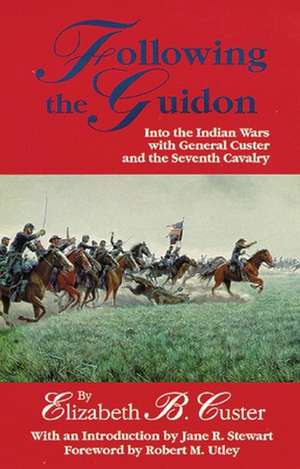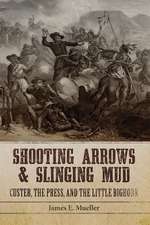Following the Guidon: Western Frontier Library (Paperback), cartea 0033
Autor Elizabeth Bacon Custeren Limba Engleză Paperback – 30 iun 1976
Few figures in American history are as arresting as George Armstrong Custer, America's Hostspur. His career ranged back and forth from depths of disgrace to heights of glory. If he was no classroom scholar, he was a magnetic battlefield commander. From dead last in his 1861 class at West Point, he rocketed to the rank of Brigadier General at the age of twenty-three. Along the way, every step of his career was dogged by controversy. Readers will be forever indebted to Elizabeth Bacon Custer for her trilogy of first-hand accounts of life with the General. In "Following the Guidon," she covers that period when Custer's career was again in ascendancy. Custer was recalled to duty from "exile," after being court-martialed, to help with the growing Indian wars. The first major engagement, recounted here, is the Battle of the Washita.
| Toate formatele și edițiile | Preț | Express |
|---|---|---|
| Paperback (2) | 176.61 lei 3-5 săpt. | |
| University of Oklahoma Press – 30 iun 1976 | 176.61 lei 3-5 săpt. | |
| DIGITAL SCANNING INC – 30 apr 1999 | 181.95 lei 38-44 zile |
Din seria Western Frontier Library (Paperback)
-
 Preț: 103.72 lei
Preț: 103.72 lei -
 Preț: 116.71 lei
Preț: 116.71 lei -
 Preț: 116.31 lei
Preț: 116.31 lei -
 Preț: 117.53 lei
Preț: 117.53 lei -
 Preț: 69.68 lei
Preț: 69.68 lei -
 Preț: 171.39 lei
Preț: 171.39 lei -
 Preț: 117.12 lei
Preț: 117.12 lei -
 Preț: 171.00 lei
Preț: 171.00 lei -
 Preț: 170.82 lei
Preț: 170.82 lei -
 Preț: 119.57 lei
Preț: 119.57 lei -
 Preț: 156.33 lei
Preț: 156.33 lei -
 Preț: 171.21 lei
Preț: 171.21 lei -
 Preț: 204.12 lei
Preț: 204.12 lei -
 Preț: 123.08 lei
Preț: 123.08 lei -
 Preț: 177.15 lei
Preț: 177.15 lei -
 Preț: 194.49 lei
Preț: 194.49 lei -
 Preț: 158.83 lei
Preț: 158.83 lei -
 Preț: 172.36 lei
Preț: 172.36 lei -
 Preț: 119.35 lei
Preț: 119.35 lei -
 Preț: 174.86 lei
Preț: 174.86 lei -
 Preț: 172.54 lei
Preț: 172.54 lei -
 Preț: 103.45 lei
Preț: 103.45 lei -
 Preț: 165.96 lei
Preț: 165.96 lei
Preț: 176.61 lei
Nou
33.80€ • 36.70$ • 28.39£
Carte disponibilă
Livrare economică 01-15 aprilie
Specificații
ISBN-10: 0806113545
Pagini: 342
Dimensiuni: 120 x 193 x 23 mm
Greutate: 0.35 kg
Ediția:Revised
Editura: University of Oklahoma Press
Seria Western Frontier Library (Paperback)














